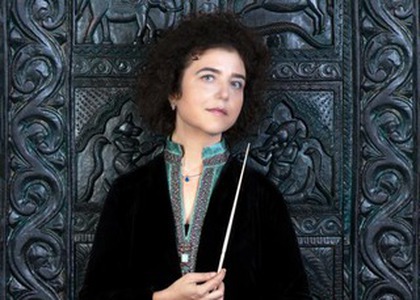> [Archived] Interviews

Interview with Lera Auerbach, pianist and conductor
On the 9th and 19th of February, Thursday and Friday, Lera Auerbach will go on the stage of the Romanian Athenaeumas the soloist and conductor of the Philharmonic Orchestra"George Enescu". The musician, also known as a composer, puts forth for all the music lovers out there,Wolfgang Amadeus Mozart's Concerto No. 20 in D minor for piano and orchestra, followed by Piotr Ilici Tchaikovsky's Symphony No. 5 in E minor.
First and foremost, how have the rehearsals been so far?
I am glad to work together with this orchestra. It is a wonderful hall, very warm, and with excellent acoustics. It is a pleasure to work here. The orchestra is great, they are very receptive, they are skilled and innovative musicians, and our collaboration is going smoothly. It creates a pleasant feeling, such an environment, so creative - it all comes down to music. I am truly impressed by the orchestra soloists; I am having fun with them!
What can you tell us about the program? How does Mozart go with Tchaikovsky?
I believe that there is a strong link between Tchaikovsky's Symphony No. 5and Mozart's Concerto No.20 in D minor. First of all, Tchaikovsky loved Mozart, he was his favourite composer. However, more importantly, the D minor Concerto exudes a Requiem ambience, given its tonality - D minor, requiem tonality. I believe that this is the point where Mozart gets closer to revealing his own feelings, fears, maybe even obsessions regarding mortality. In this aspect, it is very similar to Tchaikovsky's Symphony No. 5, since it portrays this battle between light and darkness, there is this leitmotif which connects these four movements, and Symphony No. 5, I believe, is a great narrative, in which Tchaikovsky builds a strong arc; not only because it keeps repeating this theme in different movements, but because of the ways in which it manages to create interconnections. Thus, I believe that there is a truly organic link between the two works.
How do you tackle with Mozart's Concerto in D minor for piano and orchestra as a soloist?
It is my favourite concerto of Mozart's. He kept anticipating this concerto; actually, during his lifetime, he was seeking a piano to provide him with more power. I particularly enjoy singing and conducting at the same time, since, when you make them happen at the same time, this generates a unitary interpretation of the work. Sometimes, as a soloist and as a conductor, there can be two interpretations; in best case scenario, I'll find two common areas, but when you are both a soloist and a conductor, you can truly build an unitary interpretation of the musical piece, and it becomes a special delight to do them both.
How do you think that historically informed interpretations could fit in this debate?
I believe that, ultimately, the end result is all that matters. If the interpretation is great, it doesn't matter if there is only one person who conductus and sings or not. Naturally, from a technical standpoint, orchestras found at this level don't actually require someone to manage the traffic. They need someone to bring them together, to inspire them, to let them give their best, not to be in their way. After all, it all comes down to developing synergy with the orchestra and that's where we start.
How do you try to inspire the orchestra?
Orchestra musicians are very experienced and very sensitive. They can easily tell if the person in front of them is there in order to make music or for complete other reasons - there are many reasons for which people choose to become conductors. I believe that if they get the feeling that you truly want to create music together, in an authentic way, they open up, you become a whole. If they feel that for you it's about power or ego, they look at you and go on with their business. Orchestras found at this level sing without a conductor. They are fantastic, they have experience, it is about bringing them to a whole new level by inspiring them to give their best. It is in a way, like magic, you conduct energies.
Translated by Adelina-Maria Mănăilescu,
University of Bucharest, Faculty of Foreign Languages and Literatures, MTTLC, year I
Corrected by Silvia Petrescu














